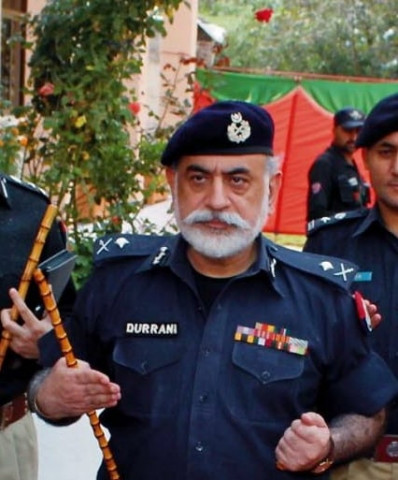Internal accountability of K-P police under check
From October, 2013 to September, 2015, 4,935 police officials have been either removed from service or punished

K-P IGP had developed a system called Police Access System to address the public complaints in the shortest possible time. PHOTO: INP
K-P IGP had developed a system called Police Access System to address the public complaints in the shortest possible time. He has also introduced the concept of I-call that would keep him connected with the public around the clock.
From October, 2013 to September, 2015, 4,935 police officials and officers have been either removed from their service or punished for their misconduct. The count includes 15 DSPs and acting SPs, 44 inspectors, 328 sub-inspectors, 321 ASIs, 385 head constables and 3,842 constables.
Legal ways
The punishments have followed a legal procedure. Whenever a complaint against a police official is received by the IGP, it is forwarded to three different agencies for verification and initial fact-finding enquiry. The procedure is required to be completed with 24 hours.
If the official is found guilty then he or she is suspended and disciplinary proceedings are ordered under the K-P police efficiency and discipline rules. On completion of these proceedings, if the official in question is still found guilty, he or she is punished as per recommendation of the enquiry officer.
Amendments in system
The K-P police efficiency and discipline rules were amended in 2014 and thereafter empowered the supervisory officers to start disciplinary proceeding against their subordinates and award them punishments.
Prior to the amendments, a DPO was unable to punish officers above the rank of SI. Similarly, an SDPO had no powers to punish an officer of any rank. It rendered SDPO ineffective while the DPOs were reluctant to post inspectors as SHOs. Likewise, the RPOs had no means to discipline the SDPOs as the power to punish rested with the IGP. The passage of these amendments has considerably improved the working of the K-P police since the delinquent officials are no longer able to exploit the loopholes of the system.
In order for officials to not misuse to the powers vested in them, a special appellate board has also been incorporated through these amendments to address the grievances of the police officials in a professional and transparent manner. Previously, only one person had the authority to review the appeals and the punished officer had only one opportunity of appeal. The board, consisting of the IGP and senior officers, provides an opportunity of second appeal.
Evidently, the K-P police are cognizant of the fact that the best gauge of performance of any police force is the public. Therefore, its success depends upon the satisfaction of the public at large.













COMMENTS
Comments are moderated and generally will be posted if they are on-topic and not abusive.
For more information, please see our Comments FAQ